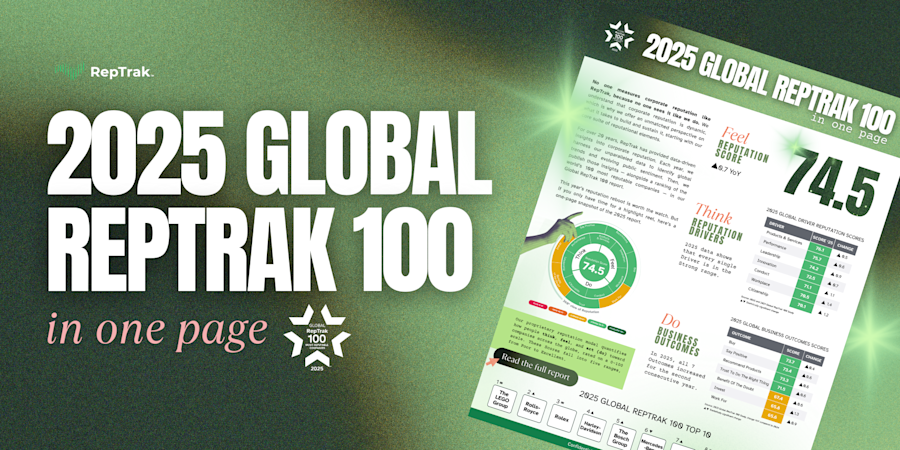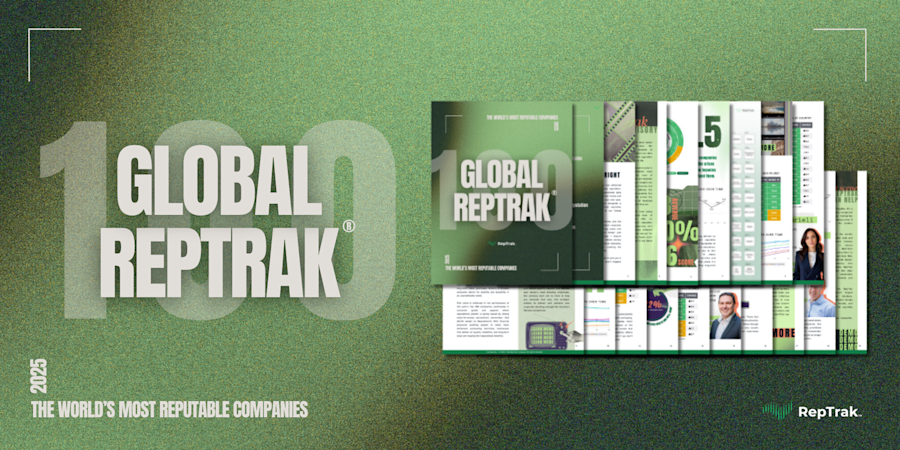This Month in Reputation: Leadership Changes and a Renewed Focus on Purpose
Blog Post12 Jan, 2020
As 2019 came to an end, corporate CEOs were on the move, and companies in multiple industries were thinking about, and re-committing themselves to, a purpose-driven business model.
Walmart CEO Doug McMillon takes chairmanship of purpose-driven Business Roundtable
Buoyed by his success over the last year—during which he made controversial decisions about guns, wages, and e-cigarettes—Walmart CEO Doug McMillon became chair of the Business Roundtable, effective January 1.
In many ways, the pairing is perfect, as earlier in 2019 the Business Roundtable declared that profit and shareholder value are no longer the primary metrics by which business success should be measured—reputation and corporate values should also play a role.
The position could help boost Walmart’s reputation among younger shoppers who care more about ethical consumption and aligning themselves with companies that share their values.
In related news, our CEO, Kylie Wright-Ford, shared her thoughts on the Business Roundtable’s Statement on the Purpose of a Corporation, saying “the work that we do cannot be dedicated to profit alone. Our time is too short and too valuable.”
Boeing parts ways with CEO Dennis Muilenburg following protracted 737 Max saga
In an effort to regain trust and improve its reputation with customers, regulators, and investors, embattled aviation giant Boeing finally said adieu to CEO Dennis Muilenburg in December, earning praise from stakeholders throughout the industry.
Muilenberg had drawn criticism for his handling of the 737 Max scandal—in which two Boeing planes crashed in similar circumstances just a few months apart in 2018, killing hundreds. Muilenberg even drew a rare admonishment from the Federal Aviation Administration for pushing an unrealistic timeline for the 737 Max to return to the air.
Boeing had stuck with Muilenberg, who worked for the company for 30 years, longer than expected, but finally recognized the need to move on and make amends. It chose Chairman David Calhoun to become the new CEO; Calhoun was expected to take over in mid January.
Teenage climate activist Greta Thunberg named Time Person of the Year
Greta Thunberg, the 16-year-old who has dedicated her life to raising awareness and inspiring action on climate change, has taken on presidents and been lauded by celebrities and scientists. Her commitment to the cause—as well as her straightforward manner—has earned her renown, especially since sustainability and environmental impact have become more important focus areas for companies and consumers in recent years.
In December, Time named Thunberg its Person of the Year for 2019. Edward Felsenthal, the magazine’s editor in chief, praised her for “sounding the alarm about humanity’s predatory relationship with the only home we have, for bringing to a fragmented world a voice that transcends backgrounds and borders” and for “showing us all what it might look like when a new generation leads.”
Thunberg, the youngest person ever to receive this honor, said it should properly be shared with everyone who participated in the Friday for the Future movement, which included weekly marches through the streets of some of the world’s largest cities.
CMOs need to focus on purpose, SAP CMO Alicia Tillman says
Traditionally, marketing practitioners and leaders have been champions of the customer and stewards of the brand. But according to SAP’s Global CMO Alicia Tillman, the focus of marketing has shifted. She writes in Chief Marketer that CMOs are now in charge of “conveying a cohesive, authentic and purpose-driven brand narrative beyond products alone.”
Purpose and values are now a place where companies can really distinguish themselves and gain advantage over their competition. Tillman cites a study by We First that found 91 percent of consumers would switch brands if a different one was purpose-driven and had similar price and quality.
“Products, experiences, and identity are now shared resources between brands and their communities,” she writes. “The next generation of marketers are taking a leading role in not only defining a brand’s identity and purpose, but bringing that story to life in a unique, creative way that authentically resonates with consumers.”
PepsiCo named Marketer of the Year
Marketing Dive named PepsiCo its Marketer of the Year, citing the beverage behemoth’s ambitious plans to integrate its business plans and its brand values through sustainable agriculture, water stewardship, a reduction in virgin plastics use and harmful ingredients, and an effort to keep greenhouse gases in check.
This comes at a time when companies are looking to walk the walk and not just talk the talk on corporate values, as accusations of “woke-washing” have become common against brands that make big, splashy ad campaigns about change while still partaking in old, harmful practices.
In that spirit, PepsiCo cut ties in 2019 with the Plastics Industry Association, a lobbying group for plastics manufacturers.
"This is a journey with a lot of work ahead of us, but we want all of our stakeholders to know that advancing to sustainability and being a more purposeful company will play an essential role in PepsiCo's future," CEO Ramon Laguarta said.
Data can help define and evaluate brand purpose, says Jim Stengel
At Adweek’s 2019 BrandWeek event in Palm Springs, Jim Stengel, president and CEO of the Jim Stengel Company consultancy, presented evidence that a standardized scoring system is necessary to evaluate brand purpose.
Drawing on findings from a Harvard Business Review study, which showed that purpose is a key driver of growth, Stengel argued it’s time to bring some clarity to brand purpose, which can often be a bit vague and aspirational.
“It’s early, but people are looking at [brand purpose] from lots of different angles,” Stengel said, noting that this is where a great deal of data can be useful. “We want to look at hard data, behavioral data and financial results, and how consumers see purpose coming to life. We didn’t have the advanced analytics [seven or eight years ago, when Stengel wrote a book on brand purpose]. Our capability to understand things is so much better now.”
Companies must commit to privacy and data security, or risk losing customer trust
In a time of constant data breaches, consumers feel like there’s no one they can trust.
It’s imperative, according to a new report from the Chief Marketing Officer Council, for businesses to reassure consumers by building a privacy-first brand and creating a privacy-first culture. After all, a data breach can tarnish a company’s brand reputation for years.
According to the report, produced in conjunction with Akamai Technologies, a majority of global marketing leaders (57 percent) believe the most critical demand of the modern customer is data security, privacy, and accountability.
“Brands need to make it explicit that they are a privacy-first organization, implementing the proper governance and distribution of data across brands, channels and touchpoints,” said John Summers, vice president and chief technology officer at Akamai Technologies. “Fundamentally, customers want brands to treat them as an individual, knowing the value they deliver. In exchange, they will provide data in order to be met as an individual.”
What stories about reputation have been catching your eye recently? I'd love to know! Share your thoughts on social media using the hashtag #RepTrak.
Melanie LoBue Senior Director of Global Marketing The RepTrak Company [email protected] @melanielobue





